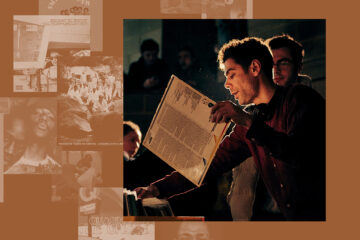The document bearing the file number 505-83SZV-92.42 that was sent to the Foreign Office by the Turkish Embassy on the 30th of October, 1961, was barely two pages long and yet it was to forever change the direction of the history of the Federal Republic of Germany. With the so-called »Anwerbeabkommen,« which was agreed upon by both sides on that day, the entry of workers who were supposed to participate in the German »Wirtschaftswunder,« the Miracle on the Rhine, was regulated. These people were called »guest workers« and the term already revealed that they were not intended to stay for long: after two years, they should go back to Turkey so that others could replace them. The recruitment agreement between the FRG and Turkey was neither the first nor the last of its kind. Previously, similar agreements had been made with Italy, Greece, and Spain, after which contracts were signed with Morocco, South Korea, Portugal and Tunisia. And yet no other had such far-reaching consequences.
»We asked for workers; we got people instead« , wrote the Swiss writer Max Frisch in the foreword to the book »Siamo italiani – The Italians. Conversations With Italian Workers in Switzerland.« The same happens when the first Turkish workers arrive in West Germany, undergo humiliating examinations and finally end up in factory halls where they are unable to communicate with anyone. One of them is called Metin Türköz. When he arrives in Munich in January 1962, he has his saz with him. Even though his stay is supposed to be a short one, bringing a piece of his own culture with him seemed only reasonable. A little later he finds himself in Cologne, where he works as a locksmith in the Ford factory, in the midst of a party whose attendants try to persuade him to sing for them. The mood is cheerful, but Türköz is not. As he begins to play, the words gush out of him. They are words about the promises and the disappointments of this life abroad, the life abroad in »Almanya, Almanya,« as the song will later be called. It is a moment that is now considered to be the birth of what is often subsumed under the term »guest worker music,« and that has a sixty-year history that ranges from Türköz to the anarchic disco-folk group Derdiyoklar İkilisi and rappers like Kool Savas or Mero. People had come to stay, and they brought music with them.
While Anadolu Pop comes to full bloom in Turkey, a virile cultural infrastructure is developing in West Germany, flourishing in the shadow of the German majority society and its music industry. Yılmaz Asöcal is the first to understand the potential of so-called Gurbetci music, the music of strangers, and who also wants to meet the needs of the newcomers. Asöcal had come to Germany as a student in 1955 and nine years later founded the Turkish-German Export company, with which he stimulates an economic and cultural exchange between the two countries. »He is one of the co-inventors of the migrant convenience stores you’ll find near every train station. Music fit in well because the music was missing here, too, « says Sebastian Reier, who with »Altın Kaniş Klübü« oversaw a compilation on the subject of guest worker music. The label Türkofon is soon founded and later renamed Türküola.
Within only a few years, Türküola becomes a platform for the music of the immigrants, including Yüksel Özkasap, Asöcal’s future wife, who soon is nicknamed »The Nightingale of Cologne« and whose sentimental songs strike a chord with the Turkish community. At the same time, albums and singles from Turkey by the likes of Cem Karaca, Selda, Moğollar, and Barış Manço & Kurtalan Ekspres are also released through Türküola. When the label opens another branch in İstanbul in 1973, Anadolu Pop is just reaching its creative and commercial peak there, while Germany officially declares an end to the recruitment agreement: twelve years after the first workers had come from Turkey and were allowed to stay well beyond the originally agreed-upon period of two years, the country is rigidly putting a stop to the economic exchange that could also have been a cultural one.
The distribution of tapes and LPs from Türküola, Uzelli and Minareci eclipses even the most refined underground networks of the punk era: a parallel music industry is emerging in greengrocers and electronics stores. Up until this day, the sheer scope of it has not been fully comprehended yet.
Nevertheless, hundreds of cassettes and records with more or less professionally recorded music by people who came as guest workers and who were largely denied access to the leading German culture are being recorded and produced en masse. With the company Uzelli in Frankfurt, founded in 1971 and active as a label from 1974 onwards, as well as the Munich imprint Minareci, which starts releasing music in the same year until the end of the nineties, the regional structures and distribution channels in Germany are consolidated. »Türküola, Minareci and Uzelli, the Big Three, have always been on the lookout and have not only released music from Turkey, but also kept an eye on what was happening around the corner,« says Ercan Demirel, who in 2004 set up an archive of Turkish and Turkish-German releases, the crowdsourced database Diskotek that today lists about 4,000 bands and singers.
Demirel is also the co-founder of the Ironhand label, which recently released an acclaimed collection of recordings by Grup Doğuş, who recorded sprawling reinterpretations of Anadolu Pop standards in Munich in the mid-1970s and then fell into oblivion. Demirel owes his discovery to the producer Grup Ses, who found the band’s only tape release in İstanbul. »It is absurd that this band has remained completely unknown. They broke up in the eighties out of fear of xenophobic attacks,« comments Reier. The history of Grup Doğuş is emblematic for many others: hundreds of albums are sold hundreds of thousands of times both here and there – without this in any way being represented by the German charts or even in regular record stores. The distribution of tapes and LPs from Türküola, Uzelli and Minareci eclipses even the most refined underground networks of the punk era: a parallel music industry is emerging in greengrocers and electronics stores. Up until this day, the sheer scope of it has not been fully comprehended yet.
But why did the production and distribution take place in completely different places and through different channels, why did the cultural exchange fail? »There was an interest for Italian disco music, Spanish music, Julio Iglesias and so on. But there was also the prejudice that everything that came from Anatolia was all yowling,« says Demirel. Even the establishment of the Teledisc label, where English-language recordings by Cem Karaca stood side by side with German-language schlager, could not change that. Even partial successes such as releases by the band Kadri Six at the end of the 1960s on the German label Intercord remained largely without consequences. »There was probably no interest in it from a German point of view, even if Turkish companies tried,« comments Demirel. A missed opportunity, Reier thinks: »The potential was completely underestimated and missed.« At the same time however, the labels and musicians simply are not dependent on being represented by commercial record stores or on the radio – their releases sell well enough already, whether in Hamburg or Ankara.
You can find the vinyl records about Gastarbeitermusik in the [HHV Records webshop](https://www.hhv.de/shop/de/music-of-gastarbeiter-innen/i:D2N4S0SP15677.)
During the 1970s, the situation in Turkey deteriorated extremely. Political instability, economic crises and the constant fights between right and left groups finally culminated in a coup in 1980, which was followed by a military dictatorship. Obviously, culture fell on hard times, especially countercultural figures like Cem Karaca, Erkin Koray, or Selda. Karaca moves to West Germany at the end of the 1970s after having already worked with the Ferdy Klein Orchestra years before and even recruiting a German guitarist for his band Kardaşlar with Alex Wiska. Countless other artists and intellectuals do the same, including the singer Bülent Ersoy, a trans woman who was banned from performing in her home country.
Karaca is the most prominent artist who strives to build cultural bridges in exile. His album »Die Kanaken« (»The Kanaks«) is released in 1984, a time that is characterised by a climate of xenophobia – referred to as »foreigner hatred,« as if the hated people had not already been living in Germany for twenty years or longer at that time. Even this album, however, is largely ignored by the majority society. »The only one who got it was [talk show host] Alfred Biolek, who at least made an effort to invite Barış Manço, Cem Karaca, and Ozan Ata Canani to his show,« says Reier. On it, Canani performs the song »Deutsche Freunde« (»German Friends«), which he had written when he was 15 years old and in which he reinterpreted the iconic Max Frisch quote: »Guest workers were called / but people arrived«. A new recording of the piece was made for the Trikont compilation »Songs of Gastarbeiter Vol. 1,« compiled by Imran Ayata and Bülent Kullukcu and released in 2014.
Türköz, Karaca and Canani are by far not the only ones who strike socially critical notes in the tradition of the aşıks, travelling Anatolian folk song singers. Even the duo Derdiyoklar, otherwise known for ironic malapropisms and their anarchic live performances, took a swing at the social and political zeitgeist in 1981: »Helmut Kohl and also Strauß (le le dear Gabi) / Want all the foreigners (le le dear Gabi),« they sing in German in the song »Liebe Gabi« (»Dear Gabi«). The snotty, funky piece unfortunately turns out to be prophetic: two years later, the Kohl government passes the »Law for the Promotion of Foreigners’ Willingness to Return to Their Home Countries,« which plays into the hands of a politician like the conservative Bavarian Prime Minister Franz Josef Strauss, who wants to reduce the number of people who migrated to Germany by half. The guests were finally asked to leave, having supposedly finished their work. In view of coordinated political efforts and the accompanying cultural ignorance, Karaca’s attempts fall on deaf ears, as do Canani’s and Derdiyoklar’s resounding criticism. And yet the FRG is becoming a temporary home for many voluntarily exiled artists who, as Reier says, record and release »things that are difficult to communicate politically« in Germany while the Turkish population is exposed to blatant repression under the military dictatorship.
»There was an interest for Italian disco music, Spanish music, Julio Iglesias and so on. But there was also the prejudice that everything that came from Anatolia was all yowling,«
Ercan Demirel
Throughout the 1980s, at least a few attempts are being made to build bridges, including the Sâada Bonaire project initiated by DJ Ralph »von« Richthoven, for which the Bremen native worked with singers Stefanie Lange and Claudia Hossfeld as well as a number of Kurdish artists. With Elektro-Dschungel, social pedagogue Winfried Nacke in Wiesbaden succeeded in gathering a comprehensive collective of musicians and in 1987 released one of the most curious albums in German music history. A D.A.F. cover meets pieces with Ali Aydoğan from Derdiyoklar İkilisi, dub meets electro-funk and proto-rap songs on »Kebab- und andere Träume« (»Kebab and Other Dreams«). This project, which has since been reactivated again and again, hardly receives any attention however, despite opening for famous rock singer Udo Lindenberg and appearing on breakfast television. »I’m also trying to find out why it never came about,« says Reier. »It always took place in a youth centre or cultural workshop ghetto, and by and large Turkish music was never elevated to art.«
From the end of the eighties and the beginning of the nineties, rap increasingly became the medium of expression for the children and grandchildren of the first generations of guest workers. Nonetheless, some of the traditions around the music spearheaded by artists such as Metin Tüköz have been preserved to this day in Germany. But their sound and appearance has changed. If you look for live performances by Derdiyoklar on YouTube, you will find energetic appearances by two hairy men who abuse their instruments with explosive energy, scream sweatily into their microphones, saz placed firmly on the neck. So this is what Turkish weddings looked like in the 1980s. »It’s not so wild anymore nowadays! What Derdiyoklar did was unique«, Demirel says about the status quo of disco folk today. But when the Cologne-based musician Elektro Hafiz calls for Halay, he adds, there are similar effects. »It works in Turkey, but also in Germany.« The music may be different, but the energy remains.
The story of the music of guest workers has come to an end solely because the people named in this way settled permanently in Germany, because guests have become locals. Dealing with it not only offers deep insights into the decades of neglect by German politics and the lack of willingness on the part of the majority society to enter into a dialogue, the life-threatening consequences of which have become apparent not only since the right-wing attacks in the early 1990s, the NSU terror, Hanau and all the other alleged »individual cases« of organised attacks directed at the descendants of people who were invited to Germany in 1961. Dealing with guest worker music also makes it possible to look around for new future models in the present. »Looking into the past is great, but not yet empowering«, says Reier, who currently initiates projects with the former Grup Doğuş organist Tufan Aydoğan at the Münchner Kammerspiele, while Dermirel with his work at Ironhand highlights a new generation of musicians who initiate new interactions with North American or European musical traditions with Anatolian music, including Elektro Hafiz or Derya Yıldırım, while producers like Anadol open up even more new perspectives with their music.









